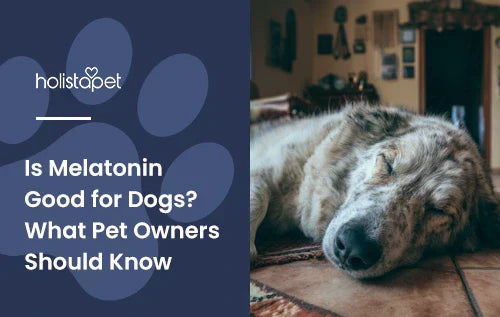You may be asking, Is melatonin good for dogs? Honestly, the interest makes sense. This sleep-friendly hormone flows naturally through the brain, guiding sleep patterns. For dogs suffering from noisy nights or separation issues, melatonin products may help restore balance.
Dog owners often choose melatonin for their canine friends' rest and relaxation. With proper guidance, melatonin supplementation can be a simple way to support their sleep and overall comfort.
What Is Melatonin?

Melatonin is a naturally occurring hormone made in the pineal gland in the brain. It helps control sleep-wake cycles in both humans and canines. Many pet owners hear about melatonin supplements because of their common use as a sleep aid. Melatonin products are available in several forms, including gummies, tablets, and chews. For dogs, it can work as a wellness solution under veterinary guidance.
How Melatonin Works in the Body
Melatonin signals the body when it's time to rest. The pineal gland releases it in response to darkness, helping regulate circadian rhythms. Canines, like people, rely on these rhythms to stay balanced and follow natural sleep-wake cycles.
When melatonin levels rise, the body slows down, creating a calming sensation that supports sleep. Supplemental melatonin can extend this natural signal, helping anxious dogs or those with sleep problems find comfort and rest.
Can Dogs Safely Take Melatonin?
Most pups can safely take melatonin when it's given under proper veterinary guidance. Vets often recommend melatonin supplements for anxious behaviors, sleep issues, or even hair fall. It's typically safe for pets when given in the correct doses. Problems usually arise if a dog receives too much melatonin or if the supplement interacts with other medications.
When Vets Recommend Melatonin for Dogs
Vets may suggest melatonin for dogs dealing with anxious behaviors, irregular sleep patterns, or noise sensitivity. This natural remedy often helps calm them during stressful events like fireworks or thunderstorms.
In some cases, vets also recommend melatonin for pups with seasonal flank alopecia, where hair loss appears in patches. Melatonin can also support senior dogs facing cognitive issues.
Benefits of Melatonin for Dogs
Melatonin for dogs offers several potential perks that go beyond better sleep. Below are the main benefits most pets may experience:
- Helps With Anxious Behaviors
- Supports Restful Sleep
- Eases Separation Issues and Noise Phobias
- Aids in Managing Seasonal Hair Loss
Helps With Anxious Behaviors
Dogs can show anxious behaviors during loud noises, car rides, or other stressful events. Melatonin may bring a soothing effect that helps reduce agitation and worried thoughts. Owners often notice their pets becoming more relaxed and less reactive in situations that would normally upset them.
Melatonin supplements work as a natural option to support comfort, minus the stronger medications. Many dogs typically respond well, making it a trusted option for easing anxious moments in daily life.
Supports Restful Sleep
Melatonin plays a direct role in guiding sleep-wake cycles, which makes it a helpful sleep aid for dogs. Some pups struggle with abnormal sleep patterns or mild sleep disorders, leaving both them and their humans tired. Melatonin may help them settle down and enjoy deeper rest.
By supporting circadian rhythms, melatonin encourages more consistent sleep cycles. Many dogs sleep more soundly with the right supplement, leading to calmer days and improved energy.
Eases Separation Issues and Noise Phobias
Dogs left alone may struggle with fear of separation, while others panic during thunderstorms or fireworks. Melatonin supplements can provide a calming effect that softens these strong reactions.
Many owners give melatonin before a stressful event, such as travel or loud gatherings. The supplement may help dogs stay more settled, reducing agitation and restlessness. With proper dosing, melatonin serves as a gentle option for dogs suffering from emotional distress.
Aids in Managing Seasonal Hair Loss
Some pups develop seasonal flank alopecia, which leads to hair fall around their sides. Melatonin supports hair growth by influencing hair follicles and improving coat condition. Dog owners often see new growth after regular melatonin intake, especially during seasonal changes.
This option offers a natural way to address skin blemishes linked to cycles of hair fall. With guidance from a vet, melatonin can help restore a fuller, healthier coat in many canine pets.
Potential Risks and Side Effects of Melatonin for Dogs
While most dogs respond well to melatonin supplements, a few may show mild discomfort or unexpected reactions. Here are some possible risks to consider:
- Drowsiness. Dogs may appear overly sleepy after use.
- Upset Stomach. Some experience queasiness or stomach troubles.
- Hormone Effects. May interact with other hormones or conditions.
- Drug Interactions. Can react with certain medications.
Dogs Who Should Avoid Melatonin
Not every pooch should take melatonin, even though it is generally safe for most. Canines with autoimmune disorders or Cushing's disease may face unwanted effects if given melatonin supplements. Puppies, pregnant dogs, and those taking other medications should also avoid it unless a vet gives specific guidance.
Melatonin products for humans often contain substitute sweeteners like xylitol, which can be toxic to dogs. Owners should skip them and ask their trusted vet about melatonin use during these situations.
How Much Melatonin To Give Your Dog - Proper Dosage Guidelines
The correct dosage depends on the dog's weight, age, and health needs. Vets' recommended dosages often range from 1 to 6 milligrams, depending on size. A common guideline is to provide 1 milligram per 10 pounds of body weight. Always keep in mind that giving too much melatonin may cause unwanted side effects, so accuracy matters. Here are some common dosage levels:
- Small dogs (<10 lbs): 1 mg
- Medium dogs (10–25 lbs): 1.5–3 mg
- Large dogs (26–100 lbs): 3–6 mg
Dog owners should avoid human-specific supplements that contain artificial sweeteners, since these can harm canines. Always follow veterinary advice for proper dosing, as it ensures the best results.
HolistaPet's Melatonin Soft Chews for Dogs – A Trusted Option

HolistaPet's Melatonin Soft Chews give pet owners a natural way to calm their dogs and support their restful sleep. Each chew blends melatonin with L-theanine, chamomile, passion flower, ashwagandha, valerian root, and other soothing herbs. These tasty chews help reduce anxious behaviors, promote relaxation, and regulate sleep cycles without harsh additives.
With 30 chews per bag, they're easy to give and loved by pups. Made with all-natural, cruelty-free, and non-GMO ingredients, they’re a trusted choice for safe, consistent calming support.
Alternative Natural Remedies for Dog Anxiety & Sleep Support
Melatonin isn't the only option for promoting calm and better sleep in dogs. These alternatives may work alone or alongside supplemental melatonin under veterinary guidance:
- CBD (Cannabidiol) for Dogs. May help calm pups and ease their worried thoughts. Good news: HolistaPet also offers soothing CBD products in chew, treat, oil, and capsule forms.
- Herbal Calming Aids. Chamomile, valerian root, and passion flower support relaxation.
- Lifestyle & Behavioral Support. Exercise, training, and safe spaces improve sleep patterns.
FAQs About Melatonin for Dogs
This section clears up some of the most common concerns about melatonin safety, dosage, and results. From how fast it works to whether it helps senior dogs, these answers provide simple guidance. Keep reading to learn more.
How quickly does melatonin work in dogs?
Melatonin usually begins working in dogs within 15 to 30 minutes after intake. The calming effect shows up as reduced agitation, less restlessness, and a more relaxed mood. Many pet parents administer melatonin before stressful events, like fireworks or travel, so it has time to take effect. The timing may vary slightly based on the dog's weight, health, and health status. But in most cases, dogs sleep or settle soon after.
Can I give my dog melatonin every night?
A dog can take melatonin every night if a vet recommends it. Vets sometimes suggest nightly use for pups with sleep disorders, abnormal sleep patterns, or chronic anxious behaviors. Giving melatonin consistently may promote rest and improve overall sleep quality. Still, owners should always check for potential side effects and avoid human products.
Is human melatonin safe for dogs?
Many human supplements include artificial sweeteners like xylitol, which is toxic to dogs even in small amounts. Owners should never give human melatonin gummies or tablets to their pets without checking the label carefully. Getting some sound veterinary guidance is the best way to confirm safety and proper dosage. To avoid risk, always choose melatonin products made specifically for dogs.
Can melatonin help senior dogs with cognitive dysfunction?
Yes, melatonin may help senior dogs with cognitive dysfunction by improving their sleep cycles and reducing nighttime restlessness. Older pups often struggle with irregular sleep patterns, which can leave both pets and owners exhausted. Giving melatonin at the correct dosage may promote calmer nights and more consistent sleep. It may also lessen anxious behaviors tied to confusion in aging dogs.
Final Thoughts – Is Melatonin Right for Your Dog?
Melatonin can be a helpful option for many dogs dealing with anxious behaviors, sleep issues, or seasonal hair loss. Pet parents can feel confident knowing it's generally safe under veterinary guidance.
For an easy and natural choice, HolistaPet's Melatonin Soft Chews offer calming support with added herbs like chamomile and valerian root. These tasty chews promote relaxation, better sleep, and peace of mind. With the right dosage, most pups rest easier.


 CBD Oil for Dogs - Fast Acting
CBD Oil for Dogs - Fast Acting
 Chicken Flavored CBD Oil For Dogs - Easy Dose
Chicken Flavored CBD Oil For Dogs - Easy Dose
 Salmon Flavored CBD Oil For Dogs - Highly Rated
Salmon Flavored CBD Oil For Dogs - Highly Rated
 CBG Oil for Dogs and Cats - Loved by Thousands
CBG Oil for Dogs and Cats - Loved by Thousands





Leave a comment
All comments are moderated before being published.
This site is protected by hCaptcha and the hCaptcha Privacy Policy and Terms of Service apply.